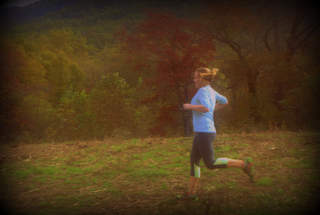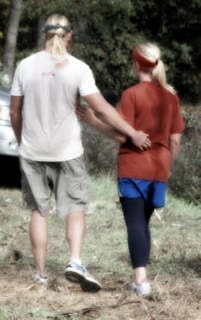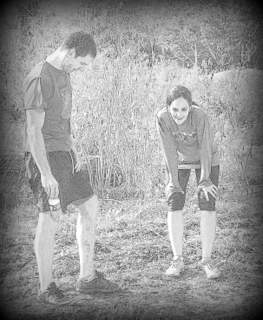Masculinity Expressing Love
 Recently I was at a mountain race where participants ran a 10K track that in places was so steep, ropes were installed so runners could pull themselves up the mountain. There were a number of couples there who raced together and, even running across the field that led to the mountain at the start of the race, the men outpaced their partners with the distance growing before they got to the places where upper body strength made even more of a difference.
Recently I was at a mountain race where participants ran a 10K track that in places was so steep, ropes were installed so runners could pull themselves up the mountain. There were a number of couples there who raced together and, even running across the field that led to the mountain at the start of the race, the men outpaced their partners with the distance growing before they got to the places where upper body strength made even more of a difference.
It was, after all, a race to the finish line.
At the finish line a woman came in first, grinning ear-to-ear. She was followed by half a dozen men, all coming in singly with each runner paced apart from one another. From that point on, some of the runners came through the finish line in groups with most holding their own as singles. Everyone was thrilled to get to the finish line and knew they’d accomplished something important on that punishing mountain.
Congratulating incoming runners at the finish line of a mountain race can take forty minutes or more to complete as the mountain sifts through runners on the basis of skill, stamina, and upper body strength. The men who ran ahead of their women waited for them at the finish line.
Nothing else existed for those men except the vigil they kept, waiting to see their partners emerge from the woods at the foot of the mountain in one piece, healthy, running, and happy to be heading to the finish line.
Among the couples, the more experienced female racers came off the mountain laughing, happy to be reunited with their lovers, celebrating what each had accomplished. The ones who had perhaps run but never raced, certainly not on a mountain, were not as thrilled to see their lovers waiting for them at the finish line. For them, the race had sifted through their emotions with feelings of abandonment, fear, even resentment coming to the surface.
One man in particular who had done especially well, being one of the first to finish, couldn’t enjoy his victory as he waited and waited and waited for his sweetheart to be among the last to come in. There was no embrace. She tried to be a good sport but the anger was too present to ignore. And just as he’d held a space for her, standing vigil till she returned, he held a quiet space for her emotional body so she could process her experience. 
Within a few minutes their energy was on the mend but I was struck by the knowledge that though, on the ride home, she might tell him in exquisite detail the emotional turmoil of her journey on that mountain, and though he might either listen till she worked it through or defend his choice to take the race seriously or try to convey the deep concern he felt as he waited for her; she would never have the experience of witnessing his attention riveted to the edge of the woods, unable to relax until he laid eyes on her, likely processing guilt with the anxiety, questioning his choice to run as an athlete in this race rather than in tandem with her.
Witnessing him, I believe I saw an example of masculinity expressing love. He was in a bind. I imagine that as an athlete, it wouldn’t have made sense for him to, for instance, run the course in reverse so that he could catch up to her and join her for the run to the finish line. Athlete to athlete, it would have been disrespectful of her.
Guilt and fear may have also frozen him to that spot as he kept vigil. Was she taking so long because she’d hurt herself? Should they have even signed up to run this race together? Was she angry, disappointed, afraid, or feeling abandoned? Did he dread finding out what she was feeling?
When she did return with transparent feelings, he allowed her the distance from him that she desired but never left her nor turned his back on her. He did not meet her anger with anger. He neither coddled her nor defended himself. He let her be in the space she was in while being present to her. He was solid as a rock. That presence he held was masculinity expressing love.
I don’t know their story. I don’t know if they are new lovers who are learning each other and learned a whole lot that day. I don’t know if they’ve been together for awhile and frequently struggle with her issues around abandonment and his need to compete and succeed. But I hope that somewhere on the ride home they saw eye-to-eye and heart-to-heart. 
With all the ways there are to say “I love you,” there’s something to be said for being receptive to hearing those words even when they come in the form of action, presence, eye contact, stability, or refraining from defending oneself.
I know the disappointment of refusing to be receptive when Joseph shows me he loves me in a way that comes naturally to him but to which I am blind and deaf. I also know the delight of paying attention and “learning” him better by being receptive to some of the masculine ways he says “I love you” that catch me by surprise.
On race day, the couple I watched and admired not only ran up a field to accomplish a mountain race; they played in the field of masculine and feminine energies – getting caught up in one of the ways those energies can get wires crossed. I hope that as the day wore on, they untangled their energy and found the warm, tender, and centered spot of their love.

